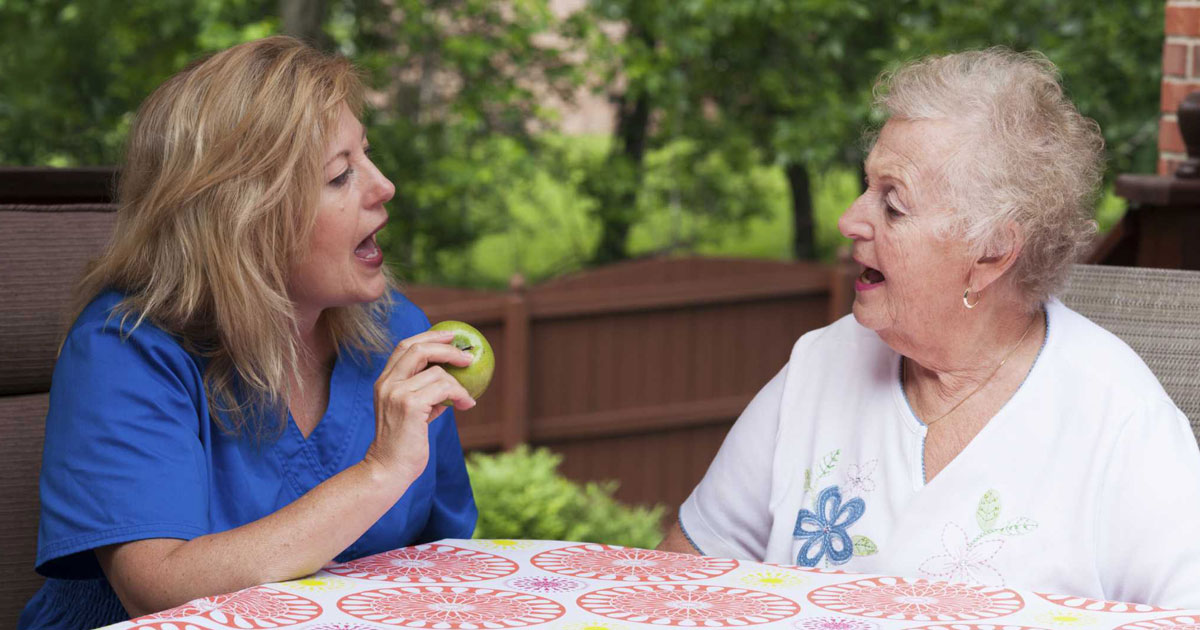How To Treat Broca's Aphasia
Broca's aphasia is one kind of aphasia (language loss). It results from damage, such as through a stroke or head injury, to the part of the brain where language is produced. An individual suffering from Broca's aphasia can usually understand what others are saying, but they cannot produce the words they need to respond. Many patients can produce nouns and verbs, but auxiliary words like prepositions and pronouns become difficult.
Sometimes a patient can only produce one word for an entire sentence. There are no medications that treat Broca's aphasia, though verbal exercises have helped patients retrain their brain to produce language. The level of recovery for each case is very individualized.
Work With A Speech-Language Pathologist

Speech therapy is an important treatment for Broca's aphasia patients. When a patient takes the time to work with a speech-language pathologist, they protect the language they still have. They work on recovering the language they have lost. This may include muscle exercises for the face and mouth, word repetition, flash cards with either words or pictures on them, reading exercises, and writing activities.
Each of these is a pathway for the patient to travel on as they try and find their way back to full or partial communication. Each builds brain centers in different ways, just as different muscle exercises help athletes strengthen their bodies for sports. Working with a speech pathologist also helps patients build skills for dealing with the frustrations that accompany Broca's aphasia and the lack of ability to communicate.
Continue Active Communication With Patients

Family and friends can provide a great deal of support for the patient. Their involvement will make a difference in how much the patient can practice their therapy exercises and language skills on a daily basis. It is important to continue active communication with patients, and family members need to be patient. They cannot correct the language for the patient, who must practice producing it themselves. They can, however, give the patient the time they need to produce words.
Others may speak to patients as an adult because they need to hear normal conversation and so their own frustration is kept at a minimum. Including them in conversation, asking for their input, and allowing them the time they need to produce communication is key for Broca's aphasia patients. It will help the patient's brain to get the practice it needs to rewrite synaptic pathways and rebuild speech skills. On the other hand, don't force the issue on a patient who is dealing with too much at a particular time.
Control Noise Levels

In order for the patient to practice their speech therapy exercises and other language skills, it helps to control noise levels within their immediate surroundings. This serves a couple of different purposes. The first is reducing environmental noise simply reduces the distractions a patient encounters when they are trying to grasp the right word during a conversation.
Nothing is more frustrating than losing the ability to communicate, unless it is those moments when a word feels as if it is right on the tip of the tongue, and something nearby distracts the patient and they have to start all over again. This can lead to withdrawal and lack of progress in recovery. Secondly, maintaining a calm and quiet environment will allow the patient's brain to gain adequate rest between daily activities. Their brain is working hard and it needs access to fully restful times during the day and healthy sleep at night.
Join A Support Group

Broca's aphasia patients who join a support group can gain added emotional support as well as increased opportunities for a broader range of language opportunities. This may include a brain health group for direct support, but it can also be a knitting group, a book group, a pet group, or any organization that lets them divert their mind while practicing their language skills.
The group needs to be aware of the patient's condition and be prepared to allow for their limits and needs. Sometimes a patient can even find a social group for Broca's aphasia patients. The group doesn't always need to be an aphasia support group to provide some social support. For instance, a fishing group can provide opportunities without pressure to produce a great deal of speech. Being out in nature can help a patient relax as well, and this reduces the stress that can interfere with brain recovery.
Make Use Of Gestures And Props

The patient suffering from Broca's aphasia still has all their intelligence and knowledge, but they just can't access the words for expression. Using gestures and props can supply a great deal of communication when words fail. With steady practice, these gestures can become quick and easily interpreted. Eating and drinking gestures are easy to understand. Reading a book or walking somewhere will be pretty simple too. Props can include objects or even just pictures of objects. Supplemented with yes-no questions, the family members and the patient can learn to communicate in ways that facilitate actual communication while not interfering with speech exercises.
Many families develop a routine for communicating with gestures and props when communication is the most important reason for interaction. At other times they take the time and effort necessary to allow the patient the exercises they need to develop further language skills for themselves. So when families make use of gestures and props, they need to not rely on those too much. Language production is essential for skill-building.
